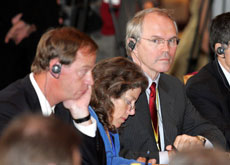|
N.Korea Abandons Nuclear Weapons, US Normalizes Ties
 |
|
North Korea agreed to rejoin the NPT. (Reuters).
|
BEIJING,
September 19, 2005 (IslamOnline.net & News Agencies) – North
Korea agreed Monday, September 19, to give up its nuclear weapons and
programs in return for a recognized right to the peaceful use of
nuclear energy and normalization of ties with the US and Japan,
capping two years of negotiations.
"This
is the most important result since the six party talks started more
than two years ago," said chief Chinese envoy Wu Dawei as all six
envoys rose and clapped, reported Agence France-Presse (AFP).
"All
six parties emphasized that to realize the inspectable non-nuclearization
of the Korean Peninsula is the target of the six-party talks."
The
communist regime has agreed to return to the Nuclear Non-Proliferation
Treaty and allow international inspections, according to a joint
statement issued at six-nation talks here.
In
return, its right to the peaceful use of nuclear energy was recognized
along with agreement to discuss light water reactors at a later date.
The
landmark agreement came after seven days of tough negotiations in
Beijing between the two Koreas, Russia, Japan, China and the United
States.
North
Korea announced on Thursday, February 10, for the first time it
possesses nuclear weapons to protect itself against an increasingly
hostile United States.
Pyongyang
accuses Washington of planning an invasion, reinforcing its 37,000
troops already in South Korea with B-1 and B-52 bombers that have been
ordered to prepare for deployment to the Korean peninsula.
After
the announcement, US Secretary of State Condoleezza Rice reiterated
assurances that the US did not intend to attack North Korea, and that
it is ready to provide security guarantees to Pyongyang.
Invectives
 |
|
The US affirmed it did not intend to attack North Korea. (Reuters).
|
The
peaceful use of nuclear energy has been at the crux of the fourth
round of talks.
South
Korea, China and Russia appeared open to the idea as a way of ending
the stalemate over the nuclear ambitions of Pyongyang, although the US
and Japan were more reluctant.
"The
DPRK (North Korea) declared its right to the peaceful use of nuclear
power," said the statement.
"The
other sides expressed respect for this and agreed that at an
appropriate time they will discuss the issue of furnishing North Korea
a light water reactor."
Washington
and Tokyo agreed to normalize ties with the impoverished and
diplomatically isolated North.
In
the statement, the other five nations also expressed willingness to
provide oil and energy aid and security guarantees to North Korea.
South
Korea reaffirmed its proposal to lay power lines across the border and
provide North Korea with two million kilowatts of electric power.
The
United States, meanwhile, affirmed that it has no nuclear weapons on
the Korean peninsula and did not intend to attack North Korea.
The
document also agreed that the six sides would push forward cooperation
in energy, trade and investment.
A
fifth round of talks is scheduled for the first half of November in
Beijing.
Three
rounds of talks have been held since August 2003 to coax Pyongyang
back to the negotiations.
Failure
to reach an agreement on dismantling North Korea's nuclear weapons
programs could have prompted Washington to take the issue to the U.N.
Security Council and press for sanctions.
The
North had said sanctions would be tantamount to war.
The
nuclear standoff erupted in October 2002 when the US accused North
Korea of operating a program based on highly enriched uranium,
violating a 1994 arms control agreement. Pyongyang denied that charge
but restarted a plutonium program.
Energy-starved
North Korea has already said it needed to re-start nuclear activities
to make up for a shortfall in energy supplies after a Washington-led
coalition cut off fuel shipments late last year.
The
shipments were suspended after Washington said in October that
Pyongyang admitted running a secret nuclear weapons program in
violation of a 1994 agreement.
Under
the agreement, the United States provided fuel aid while North Korea
halted its nuclear program.
After
the fuel shipments were suspended, North Korea resumed activity at
Yongbyon, a long-mothballed facility capable of producing
weapons-grade plutonium and withdrew from the NPT.
|